30 years ago this spring, 18-year-old Hwang Sun Ae virtually came out of nowhere to take badminton’s most coveted title, ushering in the new era of Korean badminton success. Last week, she spoke to Badzine about her brief period on top of the badminton world.
By Don Hearn, Badzine Correspondent. Photos: Don Hearn and Louis Ross
In early 1981, absolutely no one thought of Korea as a badminton powerhouse. Hwang Sun Ae’s was a veritable Cinderella story as she shot from obscurity to stardom with a quartet of wins, culminating in victory at the storied All England. Though soon hobbled by injuries, Hwang went on to claim Asian Games gold the following year but her career ended prematurely just before her 24th birthday, in the spring of 1986.
Hwang, who has been working as a teacher in her hometown of Daejeon for more than twenty years, spoke to Badzine about her life in, and love for, a game she has all but forgotten.
BZI: How did you get started as a badminton player?
Hwang: Well, actually I had already been playing table tennis for a while but then the table tennis team at my school dissolved and was replaced by a badminton team when I was in my last year of elementary school.
In Korea, still today, kids tend to be chosen to be athletes in whichever sport the school specializes in, either by the school or by the coach, unlike in some other countries, where kids have more freedom to say ‘I’d like to play this sport’. But in my case, I really wanted to play a sport.
BZI: …but that just happened to be badminton?
Hwang: That’s right. At that time, as now, it wasn’t really that I was naturally talented. Rather, I just had a lot of zeal and I really wanted to do sports so when I couldn’t play table tennis any more and the new team was formed, I switched over and became a badminton player.
I continued to play in middle school, here in the Daejeon area. We didn’t have a real gym to train in, just really a tent with a dirt floor. However, there was a women’s team at the national tobacco company headquarters, which were in my neighbourhood, and the military team, where some of Korea’s eventual top coaches played as young men, also trained in that gym so as young players we really learned a lot from the older badminton specialists training in the same place.
My middle school had a championship team, but when I graduated, there was no high school team in the area. The local badminton authorities were intent on forming one but I already had my heart set on going to high school in Masan, in South Gyeongsang Province, and playing for the Sungji Girls’ High School team there, which was already very famous for its badminton programme. So I actually ran away to Masan.
BZI: That is over 200km away. Isn’t that unusual for a player to travel that far to join a badminton team?
Hwang: These days, yes. The system is much better developed so every province has a viable team and there are experienced coaches in every region so players never go out-of-province like that. In those days, it caused quite a row because there was aggressive recruiting by the associations in both provinces. If a player did that today, they might end up getting suspended but at that time, I was a prodigy and the Korea Badminton Association ruled that I should have a chance to play in the top team in the country.
BZI: You began a long line of internationally famous stars who have graduated from Sungji Girls’ High School but was it really that famous in 1977?
Hwang: Sungji was very noticeable at every nation-wide tournament. They had proper uniforms and warmup suits and racquet bags. They had a real presence and the team already had nearly a two-decade tradition of dominance in girls’ badminton. It wasn’t that there were a few particular stars on the team, they were just a force as a group.
I was ranked number one among middle school girls at the time but no one imagined I would try to go so far away for high school but I was bound and determined to play in Masan. Running away from home to join that team wasn’t easy, though, because there was no direct transportation and I had to take a series of local trains to make it down there.
BZI: How did that go over with you parents?
Hwang: Well, my mother was raising us by herself and she was quite upset, especially because I was the youngest. But she had the rest of the family to take care of so there was no way for her to just up and come and get me to take me home.
At that time, Korea was a very different place, too. For example, there was a midnight curfew in constant effect throughout the country so the fact that I had run away from home caused a lot of problems for my family and my older brother even ended up spending a night in jail.
For a long time afterward, they used to call me ‘the traitor’ in Daejeon. After I won the gold in the Asian Games in ’82, they refused to give me any kind of welcome. Even much later, when I got my teacher’s qualifications, I was refused a placement and was told to go back to Gyeongsang Province.
BZI: What was it like for you when you first started playing badminton overseas?
Hwang: Well, I’m almost ashamed to say it but when I first competed overseas, it was the first time I’d seen Yonex racquets. We had some cheaper domestic brands of equipment here but we never got to play with top-level equipment, and sometimes had to train in a boxing gym. It was probably similar for other sports, too, because Korea was not a rich country in those days.
I played in the Asian Games in 1978 but I was still in high school at the time and had no experience and lost in the early rounds. What really started me off was an event in Taiwan in 1981.
That January, we participated in two events, in Taiwan and Japan. When I won in Taiwan and then Japan, there started to be some talk about this one Korean girl who was in pretty good shape. That was how I felt about my success, too. I have never believed that I won those tournaments because I was a skilled player. I had to have done it on fitness.
At that time, we had to be invited to an event like the All England and no Koreans had ever been at that point. It was because of those two wins that we were invited. I ended up with a ranking that got me into the main draw but the other four girls had to play qualifying.
Even with open entries, our team didn’t have the money to send us to Europe to play. But before the All England, we had events in Denmark and Sweden to play first.
BZI: When you first had to play the top players from Indonesia, Japan and Europe, were you very nervous? Did you know who they all were?
Hwang: Of course I was nervous. But I’d only ever really heard rumours about the top players. I remember my coach telling me before one match: ‘Do you know what her ranking is? She’s world #1’ but that still didn’t mean much to me because I hadn’t seen them play so I didn’t know how good a world #1 was. Also, as I had no ranking, I had no pressure on me. It was just that if I won, it would be great.
In those first tournaments in 1981, though, it was really surprising because the top players weren’t much of a challenge. They just found it so difficult to adapt to my playing style, which was so different from theirs. I seemed to play what was really a man’s game, while they were playing a real woman’s game. My speed in particular, was an advantage. Most of them seemed not to have encountered any women players who were as fast as I was.
BZI: When you first went to Europe in 1981, did you then have some confidence, since you’d beaten many of the major players already in Taiwan and Japan?
Hwang: Not at all. Both we and our coaches went there knowing absolutely nothing about what to expect from those tournaments. And the jet lag! I had no idea how to deal with that. I was so out of it in my first matches in Denmark. I could see the shuttle was ‘here’ and I just had to hit it but I would miss it altogether so many times.
Then the environment and the surroundings were so foreign to us. The shuttles and the racquets and everything were all such high quality stuff and one thing that took a lot of getting used to was the court mats. Even though we had trained a lot, when we finally got into the competition, we suddenly had to get used to playing on the mats. On wood, which was all we’d played on, you can get enough traction but the mats have no give at all so playing in Europe was such a foreign feeling even for our feet!
There was always something else changing, every day. One day we’d be interviewed and that was new for us. Then we’d have meetings with the Ambassadors and this sort of thing.
When we got to the All England, my body had finally adapted so I was in good condition physically but while most of my opponents had been doing this regularly for a few years, there were still things troubling me like wondering ‘What happens if I lose this match?’
BZI: You were invited to the embassy?
Hwang: Yes, we were invited for dinner. We met the Ambassador in England but it was particularly special in Denmark. England had hosted other sports events with Korean players before but in the case of Denmark, for one thing, there were very few Korean citizens living there, but also not a lot of Korean athletes would have cause to travel to Denmark but badminton was, of course, an exception.
BZI: How big a deal was it in Korea when you won the All England?
Hwang: At that time, there was very little in the way of the professional sports that now dominate sports news. The soccer, baseball, volleyball, and basketball leagues did not exist. Still, at that time, when I arrived back in Korea, most journalists had never seen an elite badminton match but it was big news for them to cover.
Recognition by the government was very different then, too. I was asked to visit the Blue House [the Korean president’s residence] and I was even voted Athlete of the Year.
So it was pretty big news when we came home from the All England. Bigger than I ever imagined. Korean athletes were not that successful internationally in those days so my winning such a big title was a really big deal.
BZI: In your first overseas tournaments, how did the crowds compare with what you were used to at home?
Hwang: We had played a lot of our tournaments in Korea with no spectators at all. So that was another thing I found very difficult to adjust to. With a proper stadium and the lights and, during the finals, the attention of all the spectators focussed just on me, it was impossible to ignore, it was so different.
In fact, the biggest change was in Japan. At that time, Korea only had 3 semi-pro company teams but Japan already had over a hundred. And the stadium we played in wasn’t small but it was packed and I found it so incredible that in a country so close to my own, there was such a huge gap in the popularity of badminton. It just made me so nervous.
BZI: With such a promising start to your career, how did it come to end so soon afterward?
Hwang: I injured my ankle in the final of the All England that year, actually. After that, basically every tournament, I had to get shots to numb the pain so I could get through the matches.
The first time I remember playing against Chinese opponents was at the Asian Games in 1982. I was playing doubles at the time and it was difficult for me to even walk then but I thank God that I was able to finish the match and we beat China to win the gold medal.
I think that players in Korea are very reluctant to play singles. They realize that the amount of training needed is much greater for singles and the career ends up being much shorter. We haven’t had a women’s champion since Bang Su Hyun. Su Hyun actually met me when she was a little kid and her father, who was a comedian, brought her to get my autograph and it seems she was sort of inspired to be a singles champion.
After I retired, the ligament was so gone in my ankle that even walking was difficult and just leading a normal life was hard, never mind being an elite athlete. It wasn’t a matter of just having an operation but of needing two or three.
It was especially difficult to be on the national team at that time because, unlike today, when we have many Korean players around the same level, at that time, the national team was very small and we needed an invitation to go to major tournaments. That meant if the big names weren’t there, we might not get invited so I had no choice but to keep playing for the sake of the team.
BZI: So how did your retirement actually come about?
Hwang: I was playing at one tournament and I re-injured my ankle yet again. I remember leading 10-0 and I thought I could still win it because it was only one point but the team decision was to forfeit because it was such a severe injury. It was swollen all the way up my leg and I was taken off to the emergency room and returned to Korea later in a full-leg cast.
I came back to Korea and announced my retirement but it was very hard to accept, for all concerned. The Association had had such big plans for me and I was already on the list of players for the ’86 Asian Games, which were being held in Seoul.
I had big dreams, too. I had hoped to study overseas. I had hoped to play more internationally but all of that was over. I just wanted to leave Korea and leave badminton. For a long time, I just couldn’t do anything. It was a very hard time. It’s really been like that for the last thirty years, as far as badminton is concerned. From time to time, I am contacted by journalists but usually I don’t want the reminder because I really wanted to keep playing badminton but had to leave it.
BZI: How and when did you get into teaching?
Hwang: When I was attending the National University of Physical Education in the early 80s, my supervising professor really took me under her wing and even though I was spending a lot of time out of the country, she made sure I was keeping up with the work to get my certification as a teacher. After I retired from badminton, I first left Seoul and went to the countryside but in 1989, I took a job as a teacher here in Daejeon at a small school, but teaching, not coaching badminton or anything.
In the school system, you keep getting moved around a lot by the school board and one school I went to insisted that I coach badminton, because they wanted to capitalize on having a big-name coach. But I didn’t want to be coaching. I wanted to be in the classroom.
I found it was too difficult to make the kids do what I knew, from my own experience, could hurt them. I don’t think I am cut out for coaching at the elite level. You can’t be successful without crossing a line that I just don’t feel I can cross.
BZI: You are considered to be the one who started the age of Korea’s winning tradition in badminton. How does it feel to have that distinction?
Hwang: Well, these days, I really feel that I have left badminton behind but still I can’t ignore that part of my past and when I hear something like that I think, well, I know I had some success but I also had a lot of pain because of badminton so knowing I am remembered like that really makes me feel grateful.
BZI: So you feel like you have forgotten badminton?
Hwang: It pains me that in Korea, recreational badminton players, though there are so many and they spend a lot of time playing, they still seem to hold the sport in such low esteem. I feel that in other countries, like Denmark or England, or even Canada, there is more crossover. Even thirty years after Korea has been an international force, not much has changed.
Here, the elite system is dedicated to just making the kids in elite programs play better. Recreational players should be a wealth of support for badminton but the two are so separated. So if I want anything for badminton, it would be for the sport’s profile in society to improve, so that it could be appreciated.
BZI: Korea has been having a lot of success in women’s singles lately. Do you still feel anything when you hear about these successes?
Hwang: I really am cut off. Those kids may have heard my name and I do hear about them in the news from time to time but I never have occasion to meet any of them personally. Still, I feel very grateful whenever the younger players find success in the sport. It is good for themselves, too, of course, but by succeeding internationally, they are also improving the image of the sport and the environment for those who come after them so that badminton in Korea will continue to thrive. For that, I feel grateful to them.
![All England champion Hwang Sun Ae 30 years after 30 years ago this spring, 18-year-old Hwang Sun Ae virtually came out of nowhere to take badminton’s most coveted title, ushering in the new era of Korean badminton success. Last […]](http://www.badzine.net/wp-content/uploads/Newsflash-thumbnail.png)
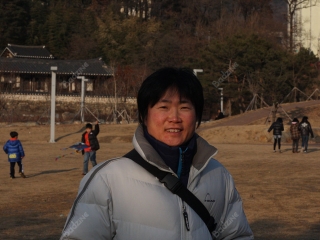
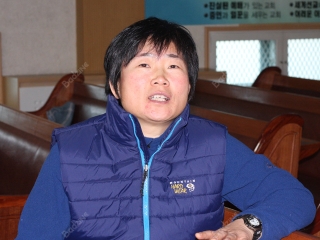
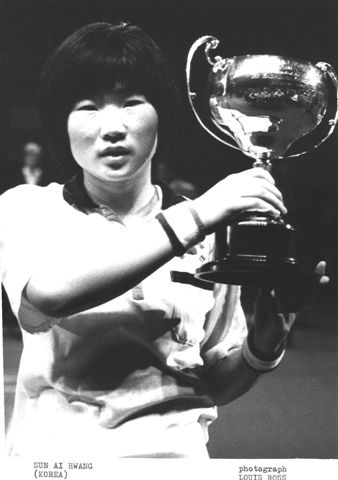
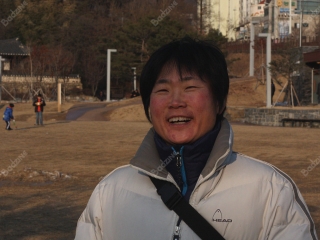
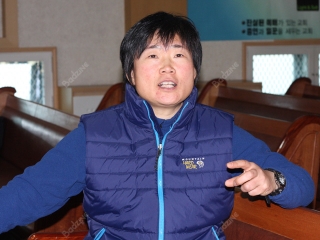

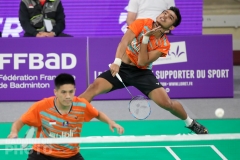
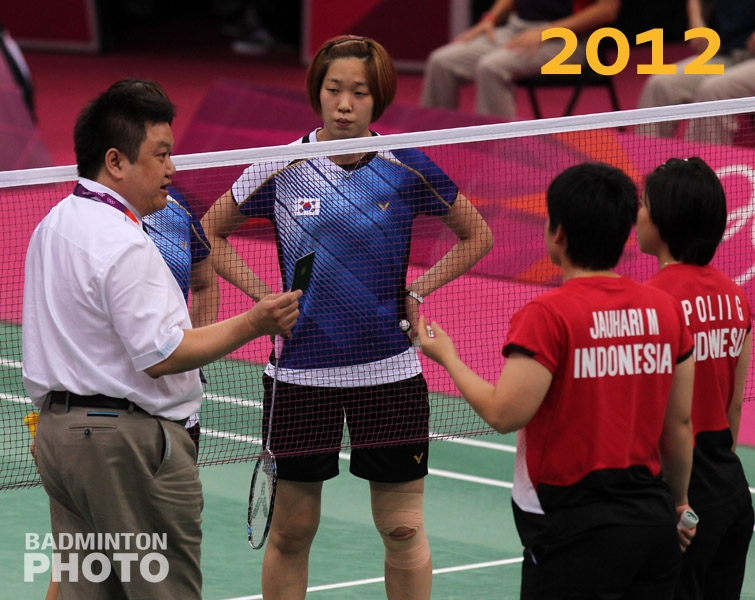
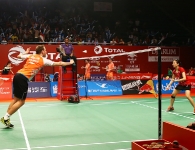
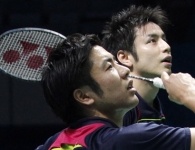
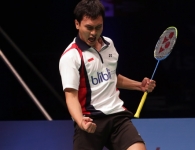
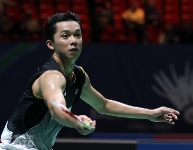
Leave a Reply